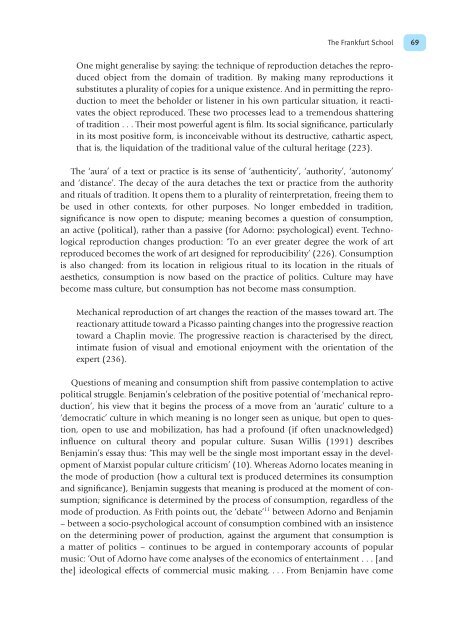Cultural Theory and Popular Culture
Cultural Theory and Popular Culture
Cultural Theory and Popular Culture
You also want an ePaper? Increase the reach of your titles
YUMPU automatically turns print PDFs into web optimized ePapers that Google loves.
The Frankfurt School 69<br />
One might generalise by saying: the technique of reproduction detaches the reproduced<br />
object from the domain of tradition. By making many reproductions it<br />
substitutes a plurality of copies for a unique existence. And in permitting the reproduction<br />
to meet the beholder or listener in his own particular situation, it reactivates<br />
the object reproduced. These two processes lead to a tremendous shattering<br />
of tradition . . . Their most powerful agent is film. Its social significance, particularly<br />
in its most positive form, is inconceivable without its destructive, cathartic aspect,<br />
that is, the liquidation of the traditional value of the cultural heritage (223).<br />
The ‘aura’ of a text or practice is its sense of ‘authenticity’, ‘authority’, ‘autonomy’<br />
<strong>and</strong> ‘distance’. The decay of the aura detaches the text or practice from the authority<br />
<strong>and</strong> rituals of tradition. It opens them to a plurality of reinterpretation, freeing them to<br />
be used in other contexts, for other purposes. No longer embedded in tradition,<br />
significance is now open to dispute; meaning becomes a question of consumption,<br />
an active (political), rather than a passive (for Adorno: psychological) event. Technological<br />
reproduction changes production: ‘To an ever greater degree the work of art<br />
reproduced becomes the work of art designed for reproducibility’ (226). Consumption<br />
is also changed: from its location in religious ritual to its location in the rituals of<br />
aesthetics, consumption is now based on the practice of politics. <strong>Culture</strong> may have<br />
become mass culture, but consumption has not become mass consumption.<br />
Mechanical reproduction of art changes the reaction of the masses toward art. The<br />
reactionary attitude toward a Picasso painting changes into the progressive reaction<br />
toward a Chaplin movie. The progressive reaction is characterised by the direct,<br />
intimate fusion of visual <strong>and</strong> emotional enjoyment with the orientation of the<br />
expert (236).<br />
Questions of meaning <strong>and</strong> consumption shift from passive contemplation to active<br />
political struggle. Benjamin’s celebration of the positive potential of ‘mechanical reproduction’,<br />
his view that it begins the process of a move from an ‘auratic’ culture to a<br />
‘democratic’ culture in which meaning is no longer seen as unique, but open to question,<br />
open to use <strong>and</strong> mobilization, has had a profound (if often unacknowledged)<br />
influence on cultural theory <strong>and</strong> popular culture. Susan Willis (1991) describes<br />
Benjamin’s essay thus: ‘This may well be the single most important essay in the development<br />
of Marxist popular culture criticism’ (10). Whereas Adorno locates meaning in<br />
the mode of production (how a cultural text is produced determines its consumption<br />
<strong>and</strong> significance), Benjamin suggests that meaning is produced at the moment of consumption;<br />
significance is determined by the process of consumption, regardless of the<br />
mode of production. As Frith points out, the ‘debate’ 11 between Adorno <strong>and</strong> Benjamin<br />
– between a socio-psychological account of consumption combined with an insistence<br />
on the determining power of production, against the argument that consumption is<br />
a matter of politics – continues to be argued in contemporary accounts of popular<br />
music: ‘Out of Adorno have come analyses of the economics of entertainment . . . [<strong>and</strong><br />
the] ideological effects of commercial music making. . . . From Benjamin have come
















